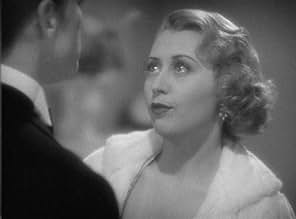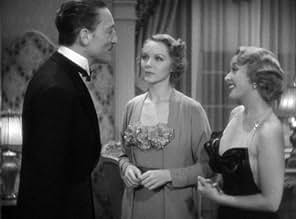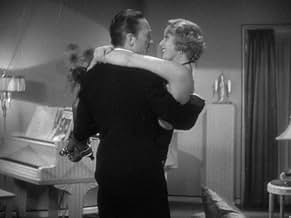Aggiungi una trama nella tua linguaVicki Wallace teases her husband Tony until he hits her. After divorcing and marrying Vernon, her behavior leads to similar results. She returns to Tony's place, where drama unfolds with his... Leggi tuttoVicki Wallace teases her husband Tony until he hits her. After divorcing and marrying Vernon, her behavior leads to similar results. She returns to Tony's place, where drama unfolds with his date Bonnie and Vernon's friends.Vicki Wallace teases her husband Tony until he hits her. After divorcing and marrying Vernon, her behavior leads to similar results. She returns to Tony's place, where drama unfolds with his date Bonnie and Vernon's friends.
- Regia
- Sceneggiatura
- Star
- Model
- (non citato nei titoli originali)
- Judge
- (non citato nei titoli originali)
- Duryla Model
- (non citato nei titoli originali)
- Court Spectator
- (non citato nei titoli originali)
- Court Recorder
- (non citato nei titoli originali)
- Mrs. Crosby's Mother
- (non citato nei titoli originali)
- Nightclub Patron
- (non citato nei titoli originali)
- Model
- (non citato nei titoli originali)
- Court Clerk
- (non citato nei titoli originali)
- Nightclub Patron
- (non citato nei titoli originali)
Recensioni in evidenza
Johnny on the spot lawyer and neighbor Edward Everett Horton offers to be Blondell's divorce attorney and he marries her. But we're talking life with Horton and his fuss budget personality.
I think you can figure this one out. It's most dated because in this day and age no one slaps a woman without condemnation.
Still F. Hugh Herbert's script has quite a few laughs in it and Warner Brothers regulars Claire Dodd and Frank McHugh get their share also as neighbors and card playing regulars.
Funny at times, but most dated.
Despite my intense dislike of the character, Joan Blondell is very good, a little different in tone than I've ever seen her. She's not quite tough, but she's certainly not weak. She's not dumb, but she's not all that smart, either (I have no idea where the title comes from; the British title, HIT ME AGAIN, makes much more sense). I laughed out loud several times, even while I was grinding my teeth at the Blondell character and the way she was treated. The acting all around is quite good. Claire Dodd and Frank McHugh provide nice comic relief (relief, that is, from the "comic" slapping and arguing that occurs among the three leads). I don't think I've ever enjoyed a movie and been so exasperated by it at the same time.
Joan Blondell, infamous for her proclivity for shedding her clothes at parties, seems right at home in this role. Her risqué comments and coy delivery fit neatly within the framework of her character.
You could not make this movie today. Even the thought of a woman inviting physical abuse upon herself is taboo. But not in "Smarty". This brisk, if somewhat slight, film bathes in its taboo-breaking with a kind of so what bravado. The characters are friendly, even affectionate, with each other despite the blows, both physical and emotional. The breezy repartee ignores the reality of the situations, instead playing light thanks to a humorous script and crisp performances.
Yes, "Smarty" is a look back at a time before PC was de riguer and people like Will H. Hays, for better or worse, ruled cinema. If you can get past the glossing over of physical violence, you may just be lured into the lead character's web. Joan Blondell brings it. Watching her performance in this movie, I don't know why she wasn't a bigger star.
At the same time, catch the sexy Vicky (Blondell) as she endlessly rolls and unrolls her hosiery, that is, when not fitting into backless evening wear or craving a little rough man-handling. In short, it's the kind of provocative material that soon brought down the heavy hand of Hollywood censorship. (Scope out the very last scene that I expect challenged even the loose conventions of the time.)
The women are well cast, including the eye-rolling Blondell, a dryly sensible Claire Dodd, and a sweetly seductive Joan Wheeler. The problem is with the two male leads. Now, I'm a big fan of Warren William who's unequalled in ruthless, authoritative parts, e.g. Employee's Entrance (1933), Skyscraper Souls (1932), which remain true period classics. The trouble is that the role here of the discombobulated husband Tony calls for the light comedy skills of a William Powell, for example; the aristocratic William does try hard, but lacks that particular flair. Also, the naturally comedic Horton is memorable in eccentric parts, but is unfortunately miscast here as a strait-laced, jealous husband.
At the same time, director Florey doesn't manage the kind of zany pacing that could have smoothed over some of the questionable parts. Too much of his deliberate tempo comes across like the stage play the material is adapted from. As a result, the movie has its moments—mainly the super coy Blondell and a provocative parade of 30's fashions—but is otherwise a titillating disappointment.
This very bizarre little comedy from Warner Bros., which sneaked in under the wire before the imposition of the Production Code, actually espouses physical abuse as the secret ingredient needed in keeping the romantic spark alive in marriage. This distressful assertion is promoted by skillful players and smug dialogue, but to no avail.
Joan Blondell, as blonde & curvaceous as ever, is portrayed as an intensely annoying young virago with all the charm of an acid bath. Endlessly nagging, the script gives her one shrill note to play, which she does with unnerving tenacity. In most of her other roles of the period she played a smart & sassy gal who has to fight her way to happiness by final fadeout. Here, Blondell starts with everything and seems determined to claw her way to the bottom again. Must be some sort of mental aberration.
Patrician Warren William & nervous Edward Everett Horton supplied wonderful moments in dozens of Golden Age films. Here, as the two men caught in Blondell's web, although they make valiant efforts, they seem out of place in the rather sordid storyline.
Rounding out the cast as two friends seemingly without meaningful lives of their own, viewers will probably find Frank McHugh to be distressingly simpleminded and pretty Claire Dodd vindictive & catty. Neither exemplify the sort of friend one would want to have during a time of domestic crisis.
Perhaps it would be well to quote a single paragraph from celebrated journalist Harriet Hubbard Ayer's essay `What Not To Do,' published in CORRECT SOCIAL USAGE (The New York Society Of Self-Culture, 1903) `Don't nag; there's nothing in it but hateful thoughts for all concerned, and such thoughts are germs that breed deceit on one side and ungovernable temper on the other. At the end of the road is division of hearts, often a divorce court.' Blondell & Company should have paid heed.
Lo sapevi?
- QuizTony tells Vicki that he's been going to the movies quite a lot recently, and there the women are quite different: "They get pushed in the face with grapefruit and they love it." This is a reference to Nemico pubblico (1931) with James Cagney, who famously shoved half a grapefruit into Mae Clarke's face. Joan Blondell also was in that film, so this apparently is an inside joke.
- BlooperAt the 4 minute mark the boom mic shadow moves on the wall by the book shelves.
- Citazioni
George Lancaster: Love is the illusion that one woman differs from another.
- ConnessioniReferences Nemico pubblico (1931)
- Colonne sonoreBridal Chorus
(1850) (uncredited)
from "Lohengrin"
aka "Here Comes the Bride"
Music by Richard Wagner
Performed by the Vitaphone Orchestra
Variation played when marriage is announced in gossip column
I più visti
Dettagli
- Data di uscita
- Paese di origine
- Lingua
- Celebre anche come
- Hit Me Again
- Luoghi delle riprese
- Azienda produttrice
- Vedi altri crediti dell’azienda su IMDbPro
- Tempo di esecuzione1 ora 5 minuti
- Colore
- Mix di suoni
- Proporzioni
- 1.37 : 1
Contribuisci a questa pagina





































